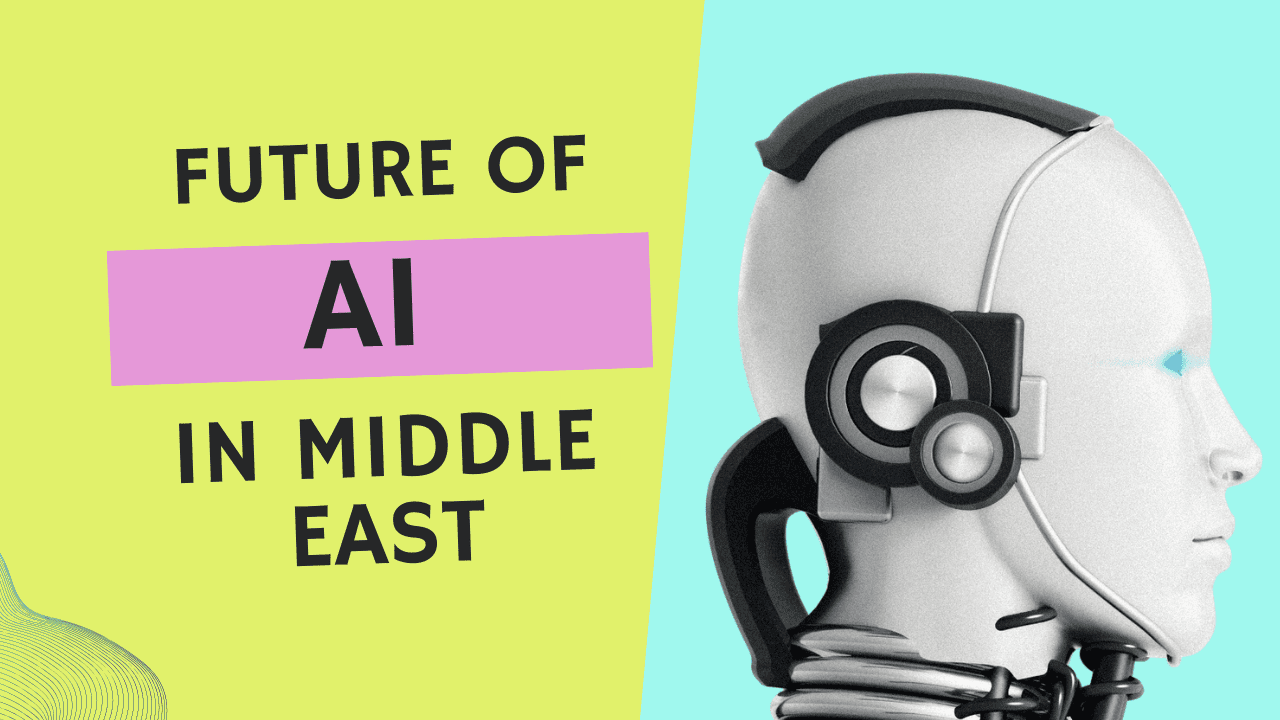With the rapidly changing global landscape, there seems to be no clear direction, prompting the need for the guidance of AI—well, at least until November 2023. AI is a pivotal opportunity for the Middle East, a chance to redefine its future, and embark on a journey, fueled by innovation, economic diversification and global competitiveness. In this blog, we explore how AI can be instrumental in building smarter nations across the Middle East and the preparations needed for this.

AI in the Middle East Today
AI adoption in the Middle East is an outstanding approach. Governments across the region have acknowledged the potential of AI to fuel innovation and boost socio-economic development.
United Arab Emirates (UAE): The UAE is a global AI leader with its National AI Strategy 2031, which is designed to make that country one of the world’s top AI innovators.
Saudi Arabia: AI is incorporated throughout healthcare, education, and smart city developments as a central tenet of Saudi Vision 2030. NEOM uses state-of-the-art AI technologies.
Qatar: The country invests in AI for sports and Qatari infrastructure with a boost from hosting the FIFA World Cup.
Israel: Referred to as the “Startup Nation”, Israel has nurtured a vibrant AI ecosystem propelled by its tech-oriented workforce and sophisticated R&D.

AI — A Key Enabler for Middle Eastern Countries
There are a few central reasons why the role of global AI formulation in the Middle East is important:
Economic Diversification: Former oil-dependent economies are pivoting to knowledge-based sectors. This transition is catalyzed by AI.
Artificial Intelligence in Smart Cities: AI is impacting city development by enabling more sustainable, efficient, and enhanced quality of life urban environments. Such projects include Masdar City in Abu Dhabi and NEOM.
AI in healthcare: AI-based solutions transform diagnostics, telemedicine, and personalized treatment that alter healthcare scenarios regionally.
Education and Workforce development: AI integration in education fosters skill development, preparing the citizens for AI-powered workplaces.

Driving Forces Shaping the Future of Middle East AI
Government polices and initiatives.
Middle East governments are leading AI integration. Key strategies include:
- Funding of R&D for AI efforts
- AI centre of excellence / incubators.
- National AI Strategies, as UAE, Saudi Arabia.
Infrastructure Development
- BUILDING DIGITAL INFRASTRUCTURE Artificial intelligence requires tremendous amounts of data to function effectively.
Partnership with Global Tech Leaders
- To capitalize on and tap AI expertise and technology, in Middle Eastern nations are forging partnerships with global AI innovators.
Startups and Entrepreneurship
- The AI-driven innovation ecosystem in countries such as the UAE and Israel is prospering.

Artificial Intelligence Applications in the Middle East
The breadth of AI use in the Middle East is diverse, with transformative ramifications across sectors:
Smart Cities
- AI-Driven Smart Cities: AI for traffic management, energy optimization, waste management, etc.
- Ex: NEOM in Saudi Arabia & Masdar City in UAE.
Healthcare
- AI algorithms help predict diseases, help in diagnostic solutions
- Improved hospital efficiency with robotics.
Education
- Education will be personalized via tours of different events.
- Virtual tutors and smart classroom technologies enhance learning outcomes.
Security and Defense
- Sophisticated AI systems enhance cybersecurity and surveillance.
- Machine learning and supply chain visibility drive data agility.
Energy and Sustainability
- AI is also adept in global energy production and distribution, ensuring to get the best out of it.
- AI is used in Renewable energy projects for forecasting and operational excellence.

Obstacles to AI Implementation in the Middle East
Promising advances aside, challenges remain:
Privacy Issues: One Issue With AI Is It Works As A Data.
Avaiability of Talent: Shortage of skilled AI professionals.
High Implementation Costs: The implementation of AI solutions comes at a high cost.
Regulatory Frameworks: The importance of robust AI ethics and governance frameworks.
The Road Ahead: How to Navigate the Future
For Middle Eastern national to exploit the full potential of AI, they need to pursue a multi pronged strategy:
Investing in Your Education and Skills
- In schools and in universities, create AI-specific courses.
- Collaboration – over skill development training or workshops
Encouraging Innovation and R&D
- Give grants and incentives to AI research
Constructing Ethical AI Structures
And that starts by maintaining ethical underpinnings of AI, instilling values in their systems so they are transparent and non-biased.
Compliance with international norms in AI governance
Public-Private Partnerships promotion
- Governments working together with the private sector can speed up the process of AI implementation.
- Promote multinational corporations to invest in local AI initiatives.
Fostering Regional Cooperation
The countries in the Middle East can collaborate by creating an alliance of AI, combining capabilities and know-how.

What Are The Emerging Trends In AI In The Middle East?
AI in the Middle East is evolving rapidly, driven by a number of trends that look set to shape its future.
Generative AI
The region is seeing momentum for generative AI, like ChatGPT and DALL-E. Companies are studying its potential in content creation, customer service and personalized marketing.
AI in Healthcare
The advancement of diagnostics, telemedicine, and predictive analytics in healthcare has been revolutionized by this AI. For instance, Saudi Arabia and the UAE have invested billions in AI-driven healthcare solutions.
AI in smart cities
AI-driven smart cities are one of the biggest investments worldwide with Saudi Arabia’s NEOM and the UAE’s Masdar City in the forefront. This includes AI for traffic control, energy optimization, smart energy solutions, and sustainability.
AI for Sustainability
AI has been deployed to millions of people harvesting vegetables, picking fruit, closing the floodgates, and optimizing the use of solar and wind power.
Arabic Language AI
Reducing the dearth of Arabic datasets and addressing the challenge of dialectical diversity are among the goals during the rise of Arabic Artificial Intelligence (AI) research focused on the understanding and processing of Arabic language.
AI in Education
AI is creating revolutionary changes in education, enabling personalized learning platforms, virtual tutors, and smart classroom technologies.
Advanced Robotics
Air recommends investing in robotics in industries such as manufacturing, logistics and health care. More and more robots are becoming humanoid and collaborative.

AI Ethics and Governance
Governments are focusing on ethical AI frameworks to promote transparency, fairness, and accountability in AI implementations.
This path signals the region’s determination to harness AI for innovation, sustainability, and socio-economic betterment. What do you find most interesting about these trends?
How do you project future advancements in AI for the Middle East?
The potential for AI in the Middle East is vast, and several trends are set to define the direction of the region:
AI-Driven Economic Growth
AI is predicted to have a huge impact on the Middle East GDP, with estimates putting the figure at $320 billion by 2030. Countries like Saudi Arabia and the UAE are at the forefront of this movement, harnessing AI to develop sectors other than oil.
Expansion of Smart Cities
This expected increase in AI-powered smart cities will happen throughout the region. NEOM (Saudi Arabia) and Masdar City (UAE) are examples of smart city projects that will leverage AI for urban planning, energy efficiency, and sustainability.
Intelligent Healthcare Solutions
Examples of such AI revolutions include in healthcare where we will see personalized medicines and better diagnostics or predicted analytics. This will help overcome the difficulties of regional healthcare, allowing better patient outcomes.
AI in Education
AI will be more widespread in the education sector in 2023, particularly in personalized learning, virtual classrooms, and skill development programs. This will enable the workforce of the future to be AI-enabled.

Ethical AI and Governance
Europe and other nations will adopt similar models, but governments in the Middle East will prioritize the establishment of ethical frameworks for AI usage, guaranteeing transparency, fairness, and accountability.
AI for Sustainability
AI will be the key to tackling environmental issues by optimizing the production of renewable energy, monitoring the effects of climate change, and much more.
Regional Collaboration
Middle Eastern countries might join forces to create AI confederations, sharing resources and know-how to speed up innovation and its uptake.
Which sectors in the Middle East will reap the most rewards from AI?
Data is the fuel for ai/ Data Access is the Key. Here are the industries that are in line to reap the biggest rewards:
Healthcare
Advancements in diagnostics, telemedicine, and personalized treatment are all being aided by AI in revolutionizing healthcare. It tackles some of regional challenges around improving access to quality care, while improving operational efficiency in hospitals.
Smart Cities and Urban Planning
Many of the most innovative projects for AI-powered smart cities are in NEOM in Saudi Arabia and Masdar City in the UAE. AI is optimizing the management of traffic, energy and waste.

Energy and Sustainability
For instance, AI plays a key role in optimizing energy production and distribution in renewable energy projects. It can help keep track of environmental impact and with cart and delivery sustainability efforts.
Education
AI is revolutionizing education with personalized learning platforms, virtual tutors, and intelligent classroom technologies. It ensures the workforce has the skills needed for an AI future.
Security and Defense
AI protection of national security including surveillance and military application
Financial Services
Artificial intelligence revolutionizing banking and finance: fraud detection, risk assessment, and personalized customer experience are all being improved by AI. It simplifies processes and enhances decision-making.
Retail and E-Commerce
The retail sector benefits from AI-powered analytics and recommendation systems that improve customer experiences and streamline supply chain processes.
Manufacturing and Logistics
There, AI-driven robotics and automation enhance productivity in manufacturing and logistics, cut back prices, and enhance output.
These sectors underscore AI’s transformative potential in the Middle East.

Conclusion: The AI Future for the Middle East
Middle East has the capacity to become a global leader in AI. By employing smart investments, creative policies, and strong relationships, the area can effectively manage its barriers and use potential. Not only may artificial intelligence (AI) change industries, but it can also improve living standards and build more intelligent, healthy nations.
The future of AI in the Middle East: Creating smarter nations is more than a vision; it is a reality. But the path will require ingenuity and cooperation. There you have it; the future is bright, and the Middle East is gearing up to make a massive impact with the AI revolution.

Also read about From AI to e-commerce: These are the megatrends that will shape the future of the Middle East
Also read about Superagency: What Could Possibly Go Right with Our AI Future
FAQs
How much AI adoption is there in the Middle East?
AI is being adopted at a blistering pace in the region, from the UAE to Saudi Arabia and Israel. Countries are drafting national strategies and spending sovereign funds on infrastructure to enable AI.
What are the challenges of the Middle East in adopting AI?
Barriers include data privacy concerns, a talent gap, high implementation costs, and the need for comprehensive regulatory frameworks.
What AI trends are emerging in the Middle East?
Generative AI, AI-powered smart cities, healthcare advancements, Arabic AI and AI ethics/framework are some trends.
How are Middle East governments supporting the development of AI?
Governments are investing in AI research and development, setting up AI centers of excellence and partnering with global tech leaders.
How does AI play a part in sustainable activity in the Middle East?
AI applications also show great potential in optimizing renewable energy generation, tracking climate change effects, and implementing sustainable practices.
How can AI adoption problems be succeeded over by the Middle East?
This could be through investing in education and skill development, fostering innovation, building frameworks for ethical AI, or encouraging public-private partnerships.





[…] Also read about The Future of AI in Middle East […]
[…] Also read about The Future of AI in Middle East […]